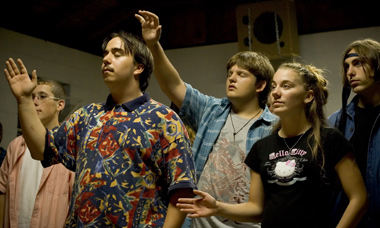For more than one hundred years, parents horrified at the prospect of having to care for their restless, sullen teens with no help at all from algebra teachers have been dumping their progeny on summer camps. In the old days, as ‘80s period pieces like “Meatballs,” “Little Darlings” and “Friday the 13th” document, these camps were shabby, isolated Edens of adolescent anarchy. Adult supervision was almost nonexistent. The air buzzed with sex and mosquitoes. Bloodthirsty maniacs skulked in the shadows. In other words, it was a lot like MySpace.com, only with canoes.
Which of course means that summer camps were way too awesome to last in that form forever. According to the American Camp Association, there are more than 12,000 camps operating in the U.S. now—and yet how many tout their ability to develop character through food-based property destruction, or advertise themselves as places where 15-year-old girls place bets on who will lose their virginity first?
In the old days, summer camps had their share of scheduled activities, but even with all the horseback riding, archery lessons, and scavenger hunts, their main draw was the Thoreauvian idleness they imposed on their charges. Out in the deep woods, with no shopping malls, no TVs, and no video arcades, there was nothing to do except smoke like French existentialists—Kristy McNichol developed a hearty appetite for cigarettes while filming “Little Darlings”—and ponder man’s true nature, the meaning of life, one’s place in the universe. Either that or play strip Monopoly until some lunatic gutted you with a rusty sickle.
Now, however, idleness and introspection have as little cachet at summer camp as they do everywhere else in contemporary society. Instead, productivity and highly specialized expertise are the goal of today’s camps. At the Digital Media Academy, for example, teen campers study “the most relevant software used in Hollywood and the entertainment industry, video game design, and web design while gaining hands-on experience under the eye of highly accomplished professionals.” Others promise to launch 12-year-olds on the fast track to Harvard, Broadway, and the NBA via intensive, nuturing tutelage from world-class ulcer inducers.
As the tubby misfits get funneled to tubby misfit camp, and the tween Bible-thumpers get funneled to tween Bible thumper camp, should we mourn the passing of the melting-pot ethos that made it so easy to cast summer camp movies? (“You must be the short depressed kid we ordered,” Bill Murray exclaims in “Meatballs.” “Glad you made it.”) A generation ago, a six-week sentence in a dumpy Catskills cabin prepared young teens for the real world by teaching them how to bully and ostracize kids of all kinds; today’s narrowly focused campers only learn how to bully and ostracize those just like themselves.
But don’t worry too much about the long-term impact of that cultural shift. The traditional summer camp experience—with all its contemplative down time, all its heterogenous drama—is still available to those who want it. We just reserve it for adults only and call it by a different name: reality TV.



